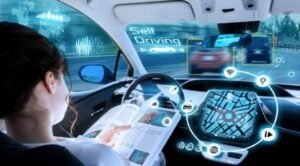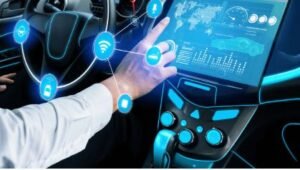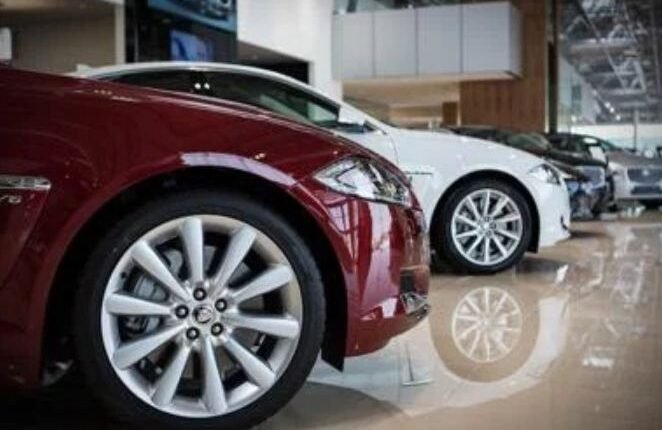If you think only your smartphone or internet companies are tracking your data, think again — your car might be doing it too.
Modern vehicles have essentially become “computers on wheels”, constantly monitoring your movements, voice, facial expressions, and even driving habits.
For instance, when you use your car’s navigation system to find a new location, it tracks your exact position. If you stop at a traffic light, unbuckle your seatbelt, or pick up your sunglasses, sensors record those actions. Even a sudden brake is logged and analyzed.
While these systems were originally designed for safety and convenience, experts now warn that the same technology poses a serious threat to personal privacy.
![]() According to a Mozilla Foundation study, modern cars have become one of the world’s “most dangerous product categories” in terms of privacy.
In a 2023 analysis of 25 major car brands, researchers found that automakers collect data on nearly every aspect of a driver’s behavior — from steering movements and door openings to navigation use.
Built-in cameras, sensors, GPS modules, satellite radio, and mobile apps are all continuously gathering information.
The real concern, however, is where all this data goes — and who gets access to it.
Where Does the Data Go?
Contrary to popular belief, this information doesn’t stay with the car manufacturer.
Experts say that much of it is shared or sold to insurance companies, marketing agencies, and data brokers.
In one major case, General Motors (GM) was penalized for sharing drivers’ data — including speeding patterns and nighttime driving — with insurers without obtaining explicit consent.
According to a Mozilla Foundation study, modern cars have become one of the world’s “most dangerous product categories” in terms of privacy.
In a 2023 analysis of 25 major car brands, researchers found that automakers collect data on nearly every aspect of a driver’s behavior — from steering movements and door openings to navigation use.
Built-in cameras, sensors, GPS modules, satellite radio, and mobile apps are all continuously gathering information.
The real concern, however, is where all this data goes — and who gets access to it.
Where Does the Data Go?
Contrary to popular belief, this information doesn’t stay with the car manufacturer.
Experts say that much of it is shared or sold to insurance companies, marketing agencies, and data brokers.
In one major case, General Motors (GM) was penalized for sharing drivers’ data — including speeding patterns and nighttime driving — with insurers without obtaining explicit consent.
![]()
![]()
![]()
![]() What Can You Do?
The first step, experts say, is awareness. Car owners should know what their vehicles are recording.
A website called Privacy4Cars.com offers a “Vehicle Privacy Report Card.” By entering your car’s Vehicle Identification Number (VIN), you can see what data your vehicle collects and where it’s sent.
Some automakers, such as Toyota, Ford, and BMW, allow users to adjust their data-sharing preferences.
For example, Toyota owners can disable the “Master Data Consent” option in the company’s app, while Ford users can turn off sharing through the FordPass app.
But There’s a Trade-Off
Disabling data sharing completely can impact certain features.
Turning off GPS tracking may disable roadside assistance or remote lock/unlock capabilities.
BMW says that if a driver fully opts out of data sharing, the car essentially operates in “flight mode” — disconnected from the company’s servers.
Before You Sell Your Car
Experts warn that before selling or trading in your car, simply handing over the keys isn’t enough.
Always perform a factory reset to delete all personal data, including mobile connections and navigation history.
If you don’t, the new owner might access your personal data — potentially affecting your insurance records or privacy.
What Can You Do?
The first step, experts say, is awareness. Car owners should know what their vehicles are recording.
A website called Privacy4Cars.com offers a “Vehicle Privacy Report Card.” By entering your car’s Vehicle Identification Number (VIN), you can see what data your vehicle collects and where it’s sent.
Some automakers, such as Toyota, Ford, and BMW, allow users to adjust their data-sharing preferences.
For example, Toyota owners can disable the “Master Data Consent” option in the company’s app, while Ford users can turn off sharing through the FordPass app.
But There’s a Trade-Off
Disabling data sharing completely can impact certain features.
Turning off GPS tracking may disable roadside assistance or remote lock/unlock capabilities.
BMW says that if a driver fully opts out of data sharing, the car essentially operates in “flight mode” — disconnected from the company’s servers.
Before You Sell Your Car
Experts warn that before selling or trading in your car, simply handing over the keys isn’t enough.
Always perform a factory reset to delete all personal data, including mobile connections and navigation history.
If you don’t, the new owner might access your personal data — potentially affecting your insurance records or privacy.
Latest updates
How Modern Cars Collect Your Data
 According to a Mozilla Foundation study, modern cars have become one of the world’s “most dangerous product categories” in terms of privacy.
In a 2023 analysis of 25 major car brands, researchers found that automakers collect data on nearly every aspect of a driver’s behavior — from steering movements and door openings to navigation use.
Built-in cameras, sensors, GPS modules, satellite radio, and mobile apps are all continuously gathering information.
The real concern, however, is where all this data goes — and who gets access to it.
Where Does the Data Go?
Contrary to popular belief, this information doesn’t stay with the car manufacturer.
Experts say that much of it is shared or sold to insurance companies, marketing agencies, and data brokers.
In one major case, General Motors (GM) was penalized for sharing drivers’ data — including speeding patterns and nighttime driving — with insurers without obtaining explicit consent.
According to a Mozilla Foundation study, modern cars have become one of the world’s “most dangerous product categories” in terms of privacy.
In a 2023 analysis of 25 major car brands, researchers found that automakers collect data on nearly every aspect of a driver’s behavior — from steering movements and door openings to navigation use.
Built-in cameras, sensors, GPS modules, satellite radio, and mobile apps are all continuously gathering information.
The real concern, however, is where all this data goes — and who gets access to it.
Where Does the Data Go?
Contrary to popular belief, this information doesn’t stay with the car manufacturer.
Experts say that much of it is shared or sold to insurance companies, marketing agencies, and data brokers.
In one major case, General Motors (GM) was penalized for sharing drivers’ data — including speeding patterns and nighttime driving — with insurers without obtaining explicit consent.



 What Can You Do?
The first step, experts say, is awareness. Car owners should know what their vehicles are recording.
A website called Privacy4Cars.com offers a “Vehicle Privacy Report Card.” By entering your car’s Vehicle Identification Number (VIN), you can see what data your vehicle collects and where it’s sent.
Some automakers, such as Toyota, Ford, and BMW, allow users to adjust their data-sharing preferences.
For example, Toyota owners can disable the “Master Data Consent” option in the company’s app, while Ford users can turn off sharing through the FordPass app.
But There’s a Trade-Off
Disabling data sharing completely can impact certain features.
Turning off GPS tracking may disable roadside assistance or remote lock/unlock capabilities.
BMW says that if a driver fully opts out of data sharing, the car essentially operates in “flight mode” — disconnected from the company’s servers.
Before You Sell Your Car
Experts warn that before selling or trading in your car, simply handing over the keys isn’t enough.
Always perform a factory reset to delete all personal data, including mobile connections and navigation history.
If you don’t, the new owner might access your personal data — potentially affecting your insurance records or privacy.
What Can You Do?
The first step, experts say, is awareness. Car owners should know what their vehicles are recording.
A website called Privacy4Cars.com offers a “Vehicle Privacy Report Card.” By entering your car’s Vehicle Identification Number (VIN), you can see what data your vehicle collects and where it’s sent.
Some automakers, such as Toyota, Ford, and BMW, allow users to adjust their data-sharing preferences.
For example, Toyota owners can disable the “Master Data Consent” option in the company’s app, while Ford users can turn off sharing through the FordPass app.
But There’s a Trade-Off
Disabling data sharing completely can impact certain features.
Turning off GPS tracking may disable roadside assistance or remote lock/unlock capabilities.
BMW says that if a driver fully opts out of data sharing, the car essentially operates in “flight mode” — disconnected from the company’s servers.
Before You Sell Your Car
Experts warn that before selling or trading in your car, simply handing over the keys isn’t enough.
Always perform a factory reset to delete all personal data, including mobile connections and navigation history.
If you don’t, the new owner might access your personal data — potentially affecting your insurance records or privacy. 

Comments are closed, but trackbacks and pingbacks are open.